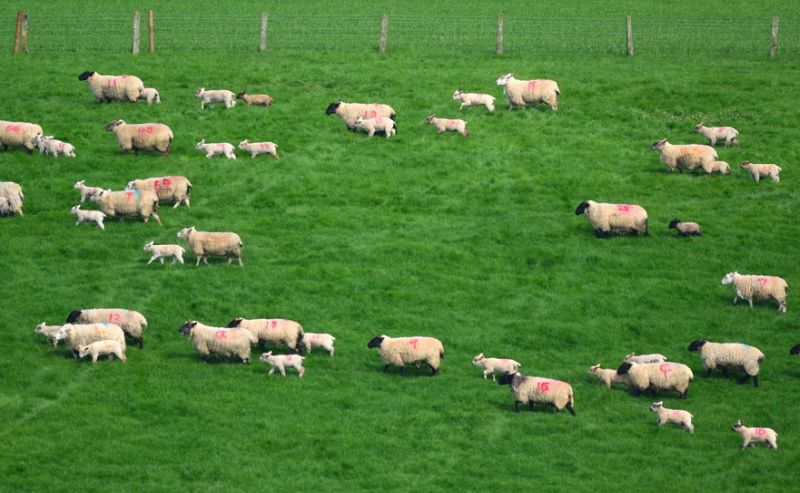New report looks at Brexit challenges across UK farming sectors

A new report released by AHDB presents a new insight into the potential impacts on trade in agricultural and horticultural goods once the UK leaves the EU.
The report, 'Brexit prospects for UK agri-food trade', examines how both an orderly withdrawal and a no-deal scenario will affect trade across the UK’s main farming sectors.
Using the latest data, the report looks at the current trade situation, potential tariff levels and the size of the domestic production base to reveal a complex picture for UK agriculture and horticulture after Brexit.
It provides comparisons between sectors in terms of imports and exports, self-sufficiency and tariff levels.
UK exports of agricultural and horticultural products are likely to be rendered uncompetitive if World Trade Organisation (WTO) tariffs come into play on British exports to the EU.
By plotting the value share of particular food products in imports and exports markets against its ad valorem tariff, the report visualises which goods would be most affected by the imposition of WTO rules if the UK defaults to no-deal.
In addition, if the government decides to drop all tariffs on imports from the EU this would have to apply to the rest of the world, meaning UK products could face increased competition on the domestic market.
'Seismic impact'
In many sectors, UK costs of production are high when compared with those of key international competitors. No deal could mean the loss of tariff barrier protection and more competition from global producers.
Report co-author, Amandeep Kaur Purewal said: “The prospect of a no-deal scenario cannot be ignored. This would have a seismic impact on UK trade in agricultural and horticultural products, with major implications for the farming sectors.
“It is crucial farmers and policy makers fully understand the potential consequences of leaving the EU, whether in an orderly or disorderly manner, if we are to avoid massive disruption throughout the industry.”
For dairy, tariffs would cause issues for cross-border trade between the UK and Republic of Ireland – large volumes of UK milk are exported to Ireland for processing, then the processed product shipped back (for example Cheddar). Tariffs under ‘no deal’ would make this trade less economical.
If the UK government unilaterally drops import tariffs, increased competition from other global exporters would reduce the opportunity of import substitution for dairy products. Conversely, if tariffs are imposed on all dairy imports, domestic prices are likely to rise.
Sheep sector 'worst hit'
The sheep meat sector is likely to be the worst hit by a no-deal Brexit, the report highlights. UK exports would suffer considerably if WTO tariffs of up to 50 per cent of the price of meat were put in place – a huge blow to the UK’s competitiveness.
In addition, around 90 per cent of UK sheep meat exports are to the EU, meaning no deal is likely to hit sheep farmers’ incomes. AHDB has examined the potential impact of no deal on UK sheep meat production in an in-depth report.
For beef, exports to the EU would also be limited considerably if tariffs, which are sometimes as high as the price of the product itself, came into play.
Again, if the UK government drops tariffs on imports, UK beef could see increased competition, meaning lower prices and returns for farmers
'Uneconomical'
Tariffs on UK pork exports would lower their competitiveness in the EU market, where the UK currently ships around 60 per cent of its pig meat.
UK sow meat, for which there is low domestic demand, is exported to Germany for processing into continental sausages and then sent back to the UK – tariffs would make this process uneconomical, the report says.
Tariffs on imports would increase domestic prices but UK pork would face increased competition and lower prices if tariffs are dropped, as well as potentially competing with products produced to lower or different standards.
For cereals, the UK is a net exporter of barley, meaning exports could be hit with tariffs of €93 a tonne outside a tariff rate quota (TRQ).
The UK flour trade could see considerable disruption even if there is a free trade agreement between the UK and EU as rules of origin would still apply, disrupting trade with the Republic of Ireland. AHDB has explored the impact on the milling and malting industries in an in-depth report.
For potatoes, there may be additional phytosanitary controls on fresh and seed potato trade between the UK and EU, which would likely make the certification process longer, increasing costs for businesses.
Given that 99 per cent of the UK’s imports of frozen potato products come from the EU, there may be an opportunity for import substitution if import tariffs were in place but considerable investment would be needed to capitalise on this.
Expensive fresh produce
For horticulture, the UK is heavily reliant on imported fresh produce so import tariffs would make these more expensive.
In addition, tariffs on inputs such as fertilisers and pesticides would increase costs of production for growers. If there are no import tariffs, this could open the door for increased volumes of imports, increasing competition and possibly lowering phytosanitary standards.
Growers would be unable to respond to any opportunity created for import substitution if import tariffs are put in place due to the critical shortage of competent seasonal labour in the UK.








